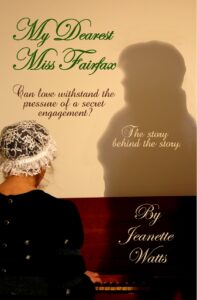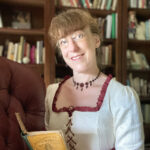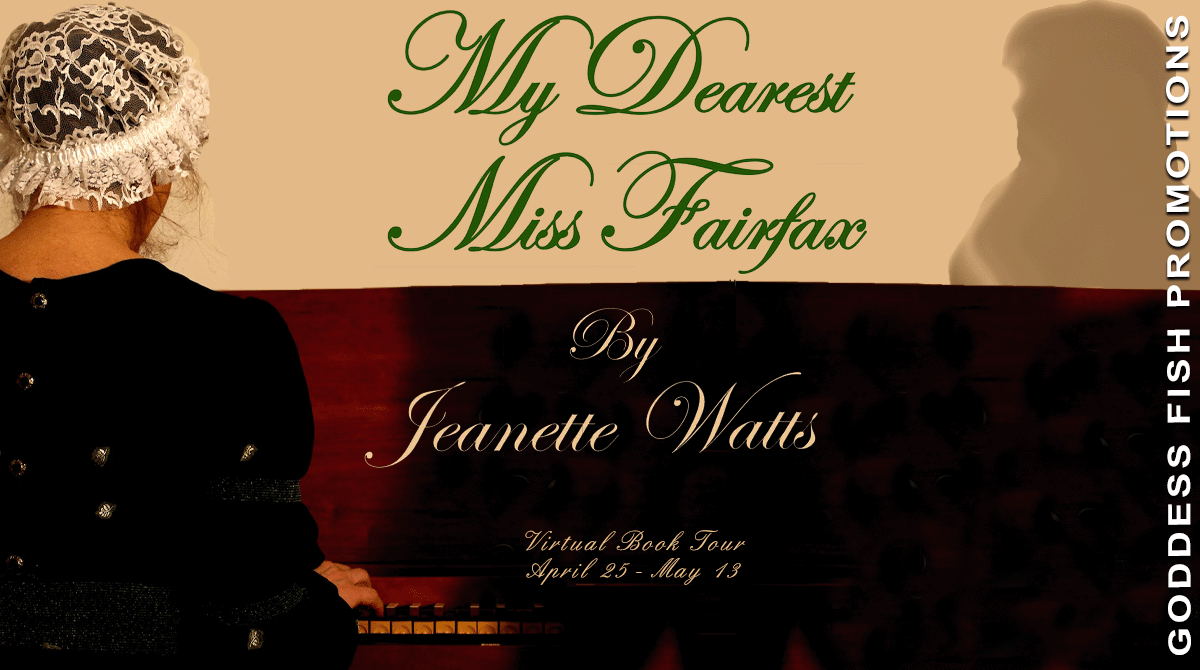 A special welcome back to today’s guest – historical fiction author Jeanette Watts. We’re chatting about her new Jane Austen fan fic novel, My Dearest Miss Fairfax.
A special welcome back to today’s guest – historical fiction author Jeanette Watts. We’re chatting about her new Jane Austen fan fic novel, My Dearest Miss Fairfax.
During her virtual tour, Jeanette will be awarding a crazy quilt tea cozy to a lucky randomly drawn winner. For a chance to win, use the form below. To increase your chances of winning, feel free to visit her other tour stops and enter there, too!
Bio:
Jeanette Watts has written 3 historical fiction novels, 2 modern Jane Austen retellings, one act plays, dance textbooks, television commercials, screenplays, and satirical essays. When she isn’t writing, she is either teaching dance or sewing. She occasionally manages to grow things in her garden when she remembers to water the plants.
Welcome back to Reviews and Interviews, Jeanette.
Thank you so much for having me back!
Please tell us about your newest release.
It is called My Dearest Miss Fairfax. It is Jane Austen’s “Emma,” carefully retold from Jane Fairfax’s point of view.
It was very important to me to have this book fit into Jane Austen’s world: I wanted people to read this and say “Yes! That is exactly what happened!” About 40 percent of the dialogue is directly taken from “Emma,” since I am talking about the same characters who heard the same conversations. I just talk about what Jane Fairfax was thinking during the same conversation, instead about what Emma Woodhouse was thinking at the time.
It’s kind of funny; I had a reader who got indignant about my portrayal of Miss Bates, and how her conversation was different and more insightful in “Emma.” Since more like 70 percent of Miss Bates’ dialogue is directly lifted from the original, I could only laugh at her bad review. I hope she went back and re-read “Emma” afterwards. Probably not.
What inspired you to write this book?
My brain hates me and never lets me finish my last idea before it comes up with something new that I absolutely HAVE to do!
I was actually in the process of BOTH writing a series of educational dance books for museums and historical re-enactors AND writing children’s books for a friend who is a very talented artist who NEEDS to be illustrating children’s books.
But then I got into this conversation in the Reddit Jane Austen group. We were talking about “Emma,” and a bunch of people were saying how much they don’t like Emma Woodhouse and her meddling ways. I was writing to defend her good qualities. I admit all her faults, but she is also good intentioned and generous and was ambitious for someone else besides herself. I also like the way she always stands up for herself every time Mr Knightley criticizes her. Read the book: he can be very critical. But she never fails to meet him with spunk.
Because life is weird, and the conversation was long and very interesting, by the end of it I was inspired to re-read “Emma” and look at the story from Jane Fairfax’s point of view. I was amazed at the wealth of information I found! I got a used copy and a pink highlighter, and got to work.
Excerpt from My Dearest Miss Fairfax:
Jane’s eyebrows went up. “It seems to me it is Miss Woodhouse to whom you should be making amends.”
“Emma? Miss Fairfax, you know that Miss Woodhouse and I have a very long tradition of verbal combat. I was sixteen years old when she was born, and I have a policy of always telling her the truth.”
“It is possible to both tell the truth and be a gentleman,” Jane told him bluntly. “The gentlemen of my acquaintance make a pointed effort to avoid saying hurtful things. They certainly would not tell a dear friend of many long years’ acquaintance that they scorn her efforts to bring pleasure to all their joint friends.”
“No, you see, you do not understand. Emma – Miss Woodhouse suffers from a lack of strong guidance,” Mr Knightley explained. “I feel some responsibility to show her when she is being foolish.”
“I certainly do not understand,” Jane answered as coldly as she could. She thought lovingly of Mr Churchill, who was working so hard to hold this ball. “There is nothing foolish about throwing a ball and giving people, how did you say it? ‘Noisy entertainment?’ That noise is called laughter. It is something one does with one’s close friends. Especially old friends that one has known for sixteen years. If Miss Woodhouse is helping her former governess to create an evening of friendship and laughter and dancing, I would say she is being generous. And you, complaining about having to stay awake when you would rather be at home all alone settling your financial accounts, are the foolish one. Now, if you will excuse me, my grandmother must be terribly hungry waiting for me to get home. Good afternoon, Mr Knightley.”
She was angry as she shut the door and climbed the stairs, and then the ridiculous nature of the moment caught hold of her. “I never thought I would see the day,” she said aloud to no one on the stairs with a laugh, “when I would be heaping praise on Miss Emma Woodhouse!”
What’s the next writing project?
Turning one of my earlier books, Jane Austen Lied to Me, into a musical. It really wants to be a Broadway musical! The first draft of the script is done, and I’m hoping I have finally found a songwriter to help me turn this project into a reality! But there’s a lot of work to do.
What is your biggest challenge when writing a new book? (or the biggest challenge with this book)
Every book presents a different challenge. My first book, Wealth and Privilege, was quite a while ago now, research meant taking a trip to Pittsburgh or Johnstown Pennsylvania and sitting in the historical archives from when they opened until they closed. I couldn’t sit on the internet at 2 am and type in “1880 census, Johnstown, PA and ‘blam!” there’s the information I’m looking for.
My second book, Brains and Beauty, was a sequel I never intended to write. But as I wrote it, I had to make absolutely certain that if I said her dress was red in the first book, it was still red in the second book. Continuity errors drive me crazy. It’s just lazy and bad storytelling. I absolutely hate the fact that in Revenge of the Jedi, Luke asks Leia, “Do you remember your mother – your real mother?” and she says “Yes, she died when I was young. She was kind, but sad.” But then in the later movies, Padme dies immediately after giving birth. Grrrr! Be consistent! I had to do mental somersaults sometimes, and I found extra readers to look for inconsistencies. But there shouldn’t be ANY.
The challenge for this book was similar: every single line I write needed to fit with Jane Austen’s “Emma.” Every character still needed to sound right – Mrs Elton still needed to sound like Mrs Elton, and Miss Bates still needed to sound like Miss Bates. Those were probably my favorite two characters to write. Austen does an amazing job writing two fairly self-centered and loquacious characters that sound absolutely nothing alike. I had to analyze each character’s speaking style and vocabulary, and match it. I also had to monitor other word choices, like contractions. I had to remove SO many contractions in my first draft! But not ALL contractions. There are a few that show up in Emma. I made a special point of continuing to use the ones that Jane Austen used.
 If your novels require research – please talk about the process. Do you do the research first and then write, while you’re writing, after the novel is complete and you need to fill in the gaps?
If your novels require research – please talk about the process. Do you do the research first and then write, while you’re writing, after the novel is complete and you need to fill in the gaps?
All of the above. I am a history buff, so you could say I am always researching. I am talking to you from Europe, where I have just been visiting the battlefield at Waterloo and any number of historic castles. While I’m writing there are times I need to stop everything and go get some answers, because I’m stuck until I know. If there’s a small detail, as opposed to a plot or character altering piece of information, I will type something inside brackets, and then I will search for the brackets later to fill in the gaps. [Place street name of milliner’s shop here.]
What’s your writing space like? Do you have a particular spot to write where the muse is more active? Please tell us about it.
Funny thing, every book I’ve written has been in a different writing space! Wealth and Privilege I wrote longhand while sitting next to my sewing machine. I would write until I got stuck, then I would sew and think, then I would stop sewing and start writing again. I wrote Jane Austen Lied to Me in a lot of hotel lobbies and pretty BnBs. My husband was interviewing for jobs AND I was traveling a lot for both book festivals and dance teaching engagements. So I would settle myself in the hotel lobby or atrium with a cup of coffee or glass of wine, and work. I wrote most of A Woman’s Persuasion in the breakfast nook of my house in Charlotte, North Carolina, overlooking the crepe myrtle blooming in my back yard. I wrote this book after moving to Illinois, during the pandemic, and my pretty places were the coffee shop in my neighborhood, a winery that’s ten minutes from my house, and my backyard which now has a few of the walking trail where I get to see all the dogs in the neighborhood talking their owners for their daily walks.
What authors do you enjoy reading within or outside of your genre?
I adore history books, especially biographies! So my favorite writers are part of my life of perpetual research. David McCullough, Ron Chernow, and Shelby Foote are the names that I will buy simply for the author! But that is probably secondary to the topic. I am a sucker for just about any book about the American Civil War. I have Mary Chestnut’s diaries and Julia Grant’s letters both waiting on my To Be Read shelf, next to a few books I’ve recently picked up on our Revolutionary war. I recently wanted the TV series “Turn” about the Culper spy ring, and I want to add to my understanding of that era. I also picked up a couple of books on Waterloo and the Napoleanic Wars while I’m in Belgium.
Anything additional you want to share with the readers today?
I would like to make a special appeal to everyone reading your blog to PLEASE post reviews for the books you read. It truly is a make-or-break situation for authors. Amazon’s algorithm is quite brutal. I would be endlessly obliged if your readers would give My Dearest Miss Fairfax a read – and then go back online and post an honest review. Just 2 or 3 sentences saying what you think: “That was fun.” Or “I didn’t like it and here’s why,” makes the difference between being a viable author who can pay the electric bill and writers who are working full-time jobs they hate just to make ends meet, while writing can only be a hobby.
Thank you for coming back to Reviews and Interviews!
Thank you for having me back! It was great to talk to you again!
Links:
Website | Facebook | Twitter | Goodreads | Pinterest | Instagram

